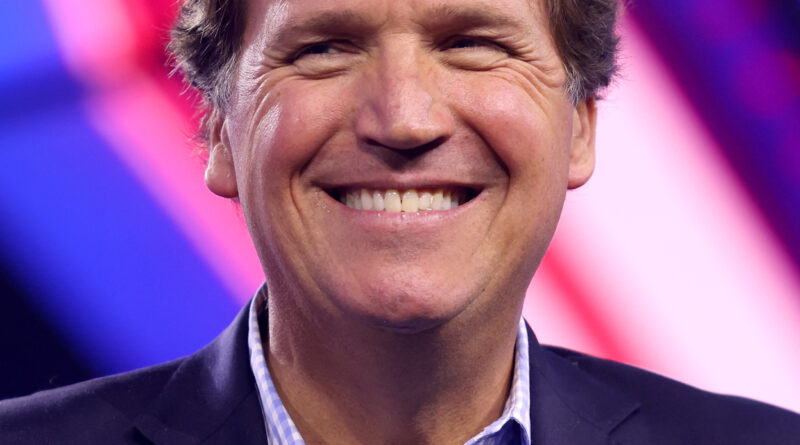Tucker Carlson Tosses Out Baseless Theories on Buttigieg’s Sexuality
Well-known conservative figure Tucker Carlson has recently subjected Democrat Pete Buttigieg to his questioning gaze, implying that Buttigieg’s claim of being gay could be nothing more than an attempt to gain political points. Strangely, this is not the first time Carlson has voiced such doubts. He sparked a similar discussion last year, leaving many to wonder about his preoccupation with Buttigieg’s personal life.
While partaking in a vibrant discussion with fellow conservative political analyst, Michael Knowles, Carlson aired his peculiar theory. With barely concealed disbelief, he referred to Pete Buttigieg as the ‘mock gay candidate.’ His supporting argument? A storyline spun around his producer, supposedly having firsthand information implying Buttigieg isn’t truly gay. This claim, devoid of any convincing proof, creates more confusion than clarity.
It appears as if Carlson is enamored with this narrative, as he forges ahead, pointing at Buttigieg’s past relationships with women during his academic years to further support his conjecture. Yet, focusing on one’s past without considering subsequent changes seems a narrow way to evaluate a person’s current reality.
According to Carlson, an interview with Buttigieg would settle the matter. His approach? Asking specific inquiries about homosexuality. A bold statement, undoubtedly, but one that seems to tiptoe around a personal judgement, rather than focusing on insightful questions related to Buttigieg’s actions and policies as a public figure.
Buttigieg has been open about his sexuality since 2015, a fact that Carlson seems to disregard in his speculations. Soon after coming out, Buttigieg crossed paths with Chasten, his now-husband, and their connection was instantaneous. The couple looked past political uncertainties and decided to build a life together, sharing moments over simple plates of Scotch eggs in a humble South Bend, Indiana pub.
Their love story resulted in a wedding in June 2018, marking three years since their first interaction on the popular dating app Hinge. Chasten became not just a partner for Pete, but a profound influence on his political journey, standing by his side as he braved the tumultuous political world as an openly gay candidate.
Their family expanded in 2021 when Pete Buttigieg and his husband, Chasten, welcomed twins Penelope and Joseph. Despite his skepticism regarding Buttigieg’s personal life, Carlson seems to gloss over this major development, which reinforces Buttigieg’s commitment as a family man and contradicts his theory of the ‘mock gay candidate.’
Interestingly, Carlson’s viewpoints become more perplexing when Kamala Harris’s former running mate, Tim Walz, comes under scrutiny. He made the contradictory assertion that Walz looked ‘extremely gay,’ which bewilderingly, didn’t align with his doubts about Buttigieg’s sexual orientation.
The paradox in Carlson’s arguments reach a new peak as he expresses surprise over Kamala Harris’s choice of running mate. Demonizing Tim Walz with his insubstantial claims, he asks why Harris didn’t simply choose Pete Buttigieg, the very figure he cast doubt upon earlier.
In a blatantly speculative and judgmental manner, Carlson brands Tim Walz as ‘obviously gay,’ basing this off nothing more than his personal perspective. Such statements, made without solid proof, expose Carlson’s willingness to make damaging claims to shape a particular narrative.
In fact, there is no credible evidence supporting Carlson’s claim about the sexual orientation of Walz. The governor of Minnesota is well-known for his long-standing marriage to Gwen Whipple, which began in 1994. The couple has two children, further dismissing Carlson’s misconceptions.
However, these factual details seem to hold little weight with Carlson, who unabashedly indulges in conjecture, much to the bemusement of those closely observing these political figures.
Nonetheless, the recurring theme in Carlson’s comments is his fervent fascination with the personal lives of these politicians, causing him to deviate from more pertinent political issues. One might argue this type of rhetoric adds little value to the political discourse.
Overall, Carlson’s assertions, contrasting in their judgment of Buttigieg and Walz, serve to highlight a disconcerting reality – not all political commentary is rooted in facts or thoughtful analysis. Sometimes, it emerges from personal bias, reinforcing the need for a more critical and thoughtful examination of political narratives.

